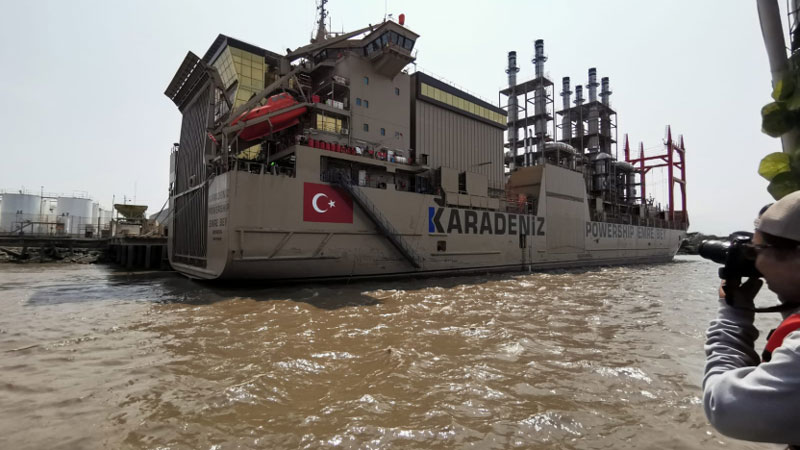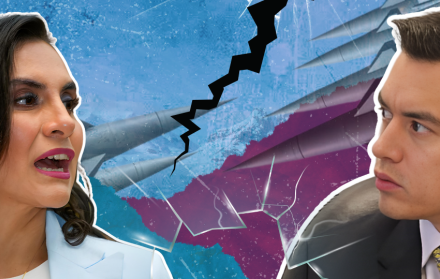As expected, Venezuela’s high court proclaims Maduro the winner but without offering proof
By Julie Turkewitz and Genevieve Glatsky
Venezuela’s highest court ruled on Thursday that the country’s authoritarian leader, Nicolás Maduro, won the July 28 presidential election, despite overwhelming evidence that Mr. Maduro’s opponent garnered the most votes.
The decision by the Supreme Tribunal of Justice asserted that Mr. Maduro’s claim to victory was based on a report from a group of “national and international experts” and was “supported by the tally reports issued by each of the vote machines.”

Caryslia Rodríguez, president of Venezuela’s top court, declares Mr. Maduro the winner in July’s presidential vote.
But the court — stacked with Maduro allies — did not share any tallies to back up this claim, despite demands from thousands of Venezuelans who have protested in the streets, as well as many in the international community, that his government produce evidence of his victory.
The decision surprised few Venezuelans, as the court has long been used to rubber-stamp the policies of Mr. Maduro, who is likely to use this ruling to strengthen his claim to the presidency. His new term is scheduled to begin in January and run through 2031.
Mr. Maduro is also likely to use the decision to argue that he should not engage in negotiations with the United States, Colombia and Brazil, which have all sought to convince his government to publish evidence of his claim to victory, recognize the actual result of the vote and agree to a power transition if the tally shows a loss.
On election night last month, the country’s Maduro-friendly election council said that Mr. Maduro had won more than 50 percent of the vote, but did not provide any evidence to back this up.
Days later, the opposition movement said it had won 67 percent of the vote, and published on its website a breakdown of the result by state and even by election machine, using tally sheets collected by state-certified election observers.
The United States recognized Venezuela’s opposition presidential candidate as the winner, ratcheting up the international condemnation of a vote riddled with irregularities. Even some of Mr. Maduro’s fellow leftist leaders in Latin America expressed grave doubts about his claim of victory.
But in response to foreign governments criticizing Mr. Maduro’s victory claim, the Venezuelan leader simply ordered some of their diplomatic missions to leave his country.
Still, the vote posed the most significant electoral challenge to Mr. Maduro since he came to office in 2013. Throughout the campaign season, his government made major efforts to weaken the opposition, including barring its most popular leader, María Corina Machado, from running for office.
Yet an opposition movement with enormous support emerged, with Edmundo González, a former diplomat, as the man on the ticket for the opposition, backed by Ms. Machado.
Following the election, several reviews of the tally sheets by researchers and independent media outlets supported the opposition’s assertion that Mr. González had won. Both the United Nations and the Carter Center, which sent delegations to Venezuela to monitor the vote, said the election did not meet international standards of transparency.
Amid the dispute, Mr. Maduro said that the country’s supreme court would make a final decision on the election result.
He also sent security forces and armed militias, called colectivos, to crack down on the thousands of Venezuelans who protested his claim of victory after the election; ramped up digital surveillance; annulled passports of activists and others; and pushed for the passage of a so-called anti-fascism law, making it easier to arrest opponents.
All of this marks an escalation of repression in a country already suffering for years under growing authoritarianism.
Mr. Maduro’s socialist movement, called Chavismo, has been in power for 25 years, overseeing an extraordinary economic collapse and severe erosion of democratic norms.
The United States has tried for years to oust the autocrat, calling his re-election in 2018 a sham, imposing harsh sanctions on the country’s oil industry and, along with dozens of other countries, backing the head of the country’s legislature, Juan Guaidó, in 2019, when Mr. Guaidó declared himself the nation’s interim leader.
None of that succeeded in removing Mr. Maduro.
Many experts say this court decision confirms what is already evident: that Mr. Maduro has no intention of leaving power.
“Maduro and his regime want to put this discussion behind and that’s what they’re signaling,” said Francisco Rodríguez, a Venezuelan economist at the University of Denver. “There are no institutions that can restrain them because they control all of the institutions.”
It is possible, he added, for an authoritarian government to collapse, pointing to examples in the Middle East and Eastern Europe. But those are the exceptions, he said.
“A lot of times these regimes do these types of things and they remain in power,” he added.
Venezuela’s foreign minister, Yvan Gil, said in televised remarks that the court’s decision “closes a chapter of the Venezuelan electoral process.”
“The rule of law has triumphed,” he added.
_________________
Credit: New York Times
















